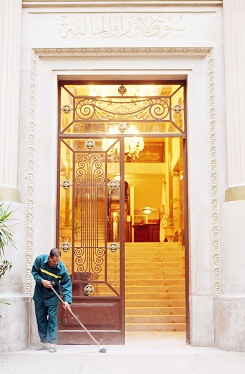Sharm El-Sheikh –Minister of Planning and Economic Development Hala El-Said stressed that adapting to climate change has become a major priority for Egypt.
The Egyptian government is also working hard on fulfilling a strategy to combat the new challenges such as climate change, water scarcity, rapid population growth, and achieve green recovery from the effects of the coronavirus pandemic, she added.
This came on the sidelines of a session in the 2022 Islamic Development Bank Group (IsDB) Annual Meetings in Sharm El-Sheikh, on “Climate Mitigation Finance, Means and Tools to Mitigate with the New Climate Targets of Carbon Print”, on Saturday.
El-Said, who is also Chairperson of the Board of Governors of the IsDB, explained that policies aimed at supporting the transition to a green economy and maintaining the sustainable use of natural resources, are the cornerstone of Egypt’s structural reforms programme launched in 2021.
The session was attended by Kamel Al-Wazir, Minister of Transport; Mahmoud Mohieldin, Executive Director of the International Monetary Fund and Climate Pioneer; Jihan Saleh, Economic Adviser to the Prime Minister; Sherif Farouk, Chairperson of Egypt Post; and Ahmed Heikal, Founder and Chairperson of Qalaa Holding. The session was moderated by Mamoun Sobeih, President of APCO International.
Moreover, El-Said said that Egypt is putting in tremendous efforts to prepare and launch the national strategies for hydrogen, managing water resources, and protecting beaches.
“Egypt also adopts environmental sustainability standards that aim for green projects to reach 30% of the state’s investment plan for fiscal year (FY) 2021/22, and 50% by FY2024/25, and cooperates with the private sector to adopt these standards,” El-Said added.
Regarding Egypt’s hosting of the COP 27 Climate Change Conference, El-Said said that Egypt aims, through this hosting, to achieve tangible progress in priority areas such as climate financing, adaptation, loss, and damage, in order to reduce the burden on the state’s general budget in implementing climate change adaptation activities.
She also mentioned the government’s announcement of a tax incentive package to boost private investment in the fields of the green economy.
The priority sectors include the production, storage, and export of green hydrogen and green ammonia, and the manufacture of plastic alternatives, including sustainable transport, and energy-efficient projects.
El-Said added that these incentives include companies operating on a larger scale of renewable energy and industrialization projects, receiving a discount ranging from 30-50% of their investment costs from taxable profits, and fixing the customs tax rate at 2% on imported machines for sustainable projects; in addition to facilitating access to land and supporting green exports, and other incentives to be announced soon.
Minister Kamel Al Wazir indicated that the ministry’s latest mass transit projects, namely the high-speed rail, electric train, and the monorail will slash carbon footprint in Egypt.




